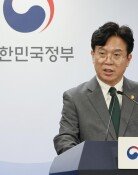Conservatives Coming Together
Conservatives Coming Together
Posted February. 02, 2005 22:59,
Conservative elites, who concentrated on individual logic development rather than social movement, have strengthened their political and social stance through solidarity.
The biggest reason for this is the change of political ground. These people, after the inauguration of Roh Moo-hyuns government, worry that Korean society is heading towards the left with the spread of negative views of Korean modern history, criticism of the problems of the market economy, worsening ties with the U.S., and dovishness against North Korea policy. This is why they are emphasising the superiority of free democracy and the market economy.
Another reason might be that while progressive elites are entering government organizations or participating in various committees, conservative elites, who participated in the past governments policy making, did not get any chance to do so. The result has been leading a movement through systemization.
The New Right movement is led by comparably young people in their 30s or 40s who have past student-movement experience. Their experience of student movement made them lead the systemization. Following them, older conservative elites, who already constructed individual stances, are trying for systemization through elite declaration groups. There are a lot of similarities found when analysing conservative elites various social empowerment movements.
Conservative elites see Korean modern history as a successful and proud one. They are proud of the fact that despite war, poverty, and dictatorship after the liberation, Korea achieved surprising economic growth in a very short time, and also achieved political democratisation. On top of this, they believe that it was due to the decision to select a free democracy and a market economy when liberated and the fact that there was a strong Korea-U.S. alliance.
However, with the Roh Moo-hyun governments inauguration, past government shame was disclosed in the name of past history truth finding, and it worries that only the memory of rotten parts and dictatorship is being stressed. They criticise that by stressing only the negative side of right-wing leaders who constructed and led Korea, we are making Korean modern history into a shameful one and are weakening Koreas tradition. Furthermore, they criticise that after George W Bushs inauguration, the U.S.s hegemony has spread worldwide, raising anti-Americanism and shaking the root of the Korea-America alliance.
Conservative elites stress growth rather than distribution in economic policy. They wish to grow the pie before cutting it. Therefore, they criticize Roh governments emphasis on distribution and social welfare leads sluggish economic growth. Distribution should not be just giving out what was taken from the rich, but creating jobs through economic growth.
On top of this, they argue that government intervention should be kept to the minimum and that individual-level freedoms should be guaranteed to the maximum. Therefore they are against Rohs policy of regulating enterprise, press, and private foundations. While the government is on the negative side of concentrating on firms, they criticise that leniently treating labor-company confrontations is a zero-sum game where the strong and the weak take and give.
Conservative elites say that the North Korean problem should be dealt with basically on the human side. They say that North Koreans, who are suffering under the Kim Jong Il government, human state improvements, and policy against North Korea should be linked. Furthermore, they dislike progressive arguments that call for achieving unification through any form or system and argue that free democracy and market economy should be at the root of unification.
Therefore, Rohs policy of not poking North Korea in order to reform it only gives the North more power and does not help improve North Korean lives. They criticise that weakening the Korea-U.S. alliance by concentrating on improvement with North Korea is shaking Korean security policy that was carried out for 60 years.
Conservatives also see that the spread of Korean modern historys negative view due to the movement of progressive elites and improving the view towards the North as a tradition crisis. The reasons for them being against the National Security Laws abolition are worry for the demolition of tradition as well as basic security consciousness.
Chae-Hyun Kwon confetti@donga.com







